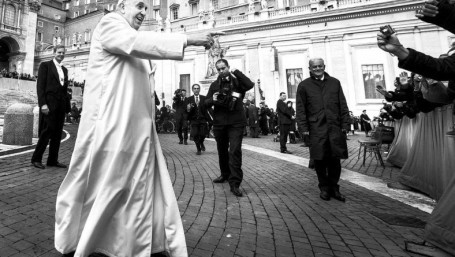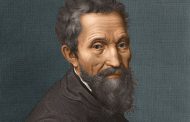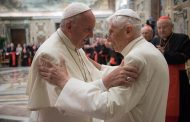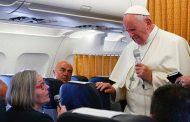In his new book, The Church of Mercy—a compilation of speeches, homilies, and writings collected from the first year of Pope Francis’s papacy—the pontiff outlines his vision for a Catholic Church dedicated, first and foremost, to serving those in need. Read five more exclusive passages from the book below.
Pope Francis on listening “to the cry of the poor” :
… I want a Church that is poor and for the poor. They have much to teach us. Not only do they share in the sensus fidei, but in their difficulties they know the suffering Christ. We need to let ourselves be evangelized by them. The new evangelization is an invitation to acknowledge the saving power at work in their lives and to put them at the center of the Church’s pilgrim way. We are called to find Christ in them, to lend our voice to their causes, but also to be their friends, to listen to them, to speak for them, and to embrace the mysterious wisdom that God wishes to share with us through them.
(Excerpted from Evangelii gaudium, one of Pope Francis’s first major writings as the leader of the Church, published on November 24, 2013.)
On building a “house of harmony” :
Let us think about the image of a symphony, which implies accord, harmony, various instruments playing together. Each one preserves its own unmistakable timbre, and the sounds characteristic of each blend together around a common theme. …
This is a beautiful image illustrating that the Church is like a great orchestra in which there is great variety. We are not all the same, and we do not all have to be the same. We are all different, varied, each of us with our own special qualities. And this is the beauty of the Church: everyone brings their own gift, which God has given, for the sake of enriching others.
(Adapted from the pope’s October 9, 2013 general audience at St. Peter’s Square.)
On forging a “commitment to peace” :
In the world, in society, there is little peace because dialogue is missing; we find it difficult to go beyond the narrow horizon of our own interests in order to open ourselves to a true and sincere comparison. Peace requires a persistent, patient, strong, intelligent dialogue by which nothing is lost. Dialogue can overcome war. Dialogue can bring people of different generations who often ignore one another to live together; it makes citizens of different ethnic backgrounds and of different beliefs coexist. Dialogue is the way of peace. For dialogue fosters understanding, harmony, concord, and peace. For this reason, it is vital that it grow and expand between people of every condition and belief, like a net of peace that protects the world and especially protects the weakest members.
(Adapted from the pope’s address at the International Meeting for Peace, sponsored by the Community of Sant’Egidio, a laypeople’s group, given in Rome on September 30, 2013.)
On inspiring a new generation of “priests who come to serve” :
Today I ask you in the name of Christ and the Church, never tire of being merciful. You will comfort the sick and the elderly with holy oil: do not hesitate to show tenderness toward the elderly. When you celebrate the sacred rites, when you offer prayers of praise and thanks to God throughout the hours of the day, not only for the people of God but for the world—remember then that you are taken from among men and appointed on their behalf for those things that pertain to God. Therefore, carry out the ministry of Christ the Priest with constant joy and genuine love, attending not to your own concerns but to those of Jesus Christ. You are pastors, not functionaries. Be mediators, not intermediaries.
(Adapted from the pope’s homily at the Vatican April 21, 2013.)
On eschewing “power, profit, and money” and remembering “the value of the human person” :
Today’s economic and social crisis … highlights even more clearly the truth and timeliness of affirmations of the social magisterium such as the one we read in Laborem exercens [by Pope John Paul II, 1981]: “As we view the whole human family . . . we cannot fail to be struck by a disconcerting fact of immense proportions: the fact that, while conspicuous natural resources remain unused, there are huge numbers of people who are unemployed or underemployed and countless multitudes of people suffering from hunger. This is a fact that without any doubt demonstrates that . . . there is something wrong” (no. 18).
Unemployment—the lack or loss of work—is a phenomenon that is spreading like an oil slick in vast areas of the West and is alarmingly widening the boundaries of poverty. Moreover, there is no worse material poverty, I am keen to stress, than the poverty that prevents people from earning their bread and deprives them of the dignity of work. Well, this “something wrong” no longer relates only to the South of the world but also to the entire planet. Hence the need to rethink solidarity no longer as simply assistance for the poorest, but as a global rethinking of the whole system, as a quest for ways to reform it and correct it in a way consistent with the fundamental rights of all human beings.
The current crisis is not only economic and financial but is rooted in an ethical and anthropological crisis. Concern with the idols of power, profit, and money, rather than with the value of the human person, has become a basic norm for functioning and a crucial criterion for organization. We have forgotten and are still forgetting that over and above business, logic, and the parameters of the market is the human being.
(Excerpted from Pope Francis’s address to the Centesimus Annus Pro Pontifice Foundation, a laypeople’s group, on May 25, 2013.)
Reprinted from The Church of Mercy, by Pope Francis, with permission from Loyola Press. To find out more about the book, visit PopeFrancis.LoyolaPress.com.
For more info:





